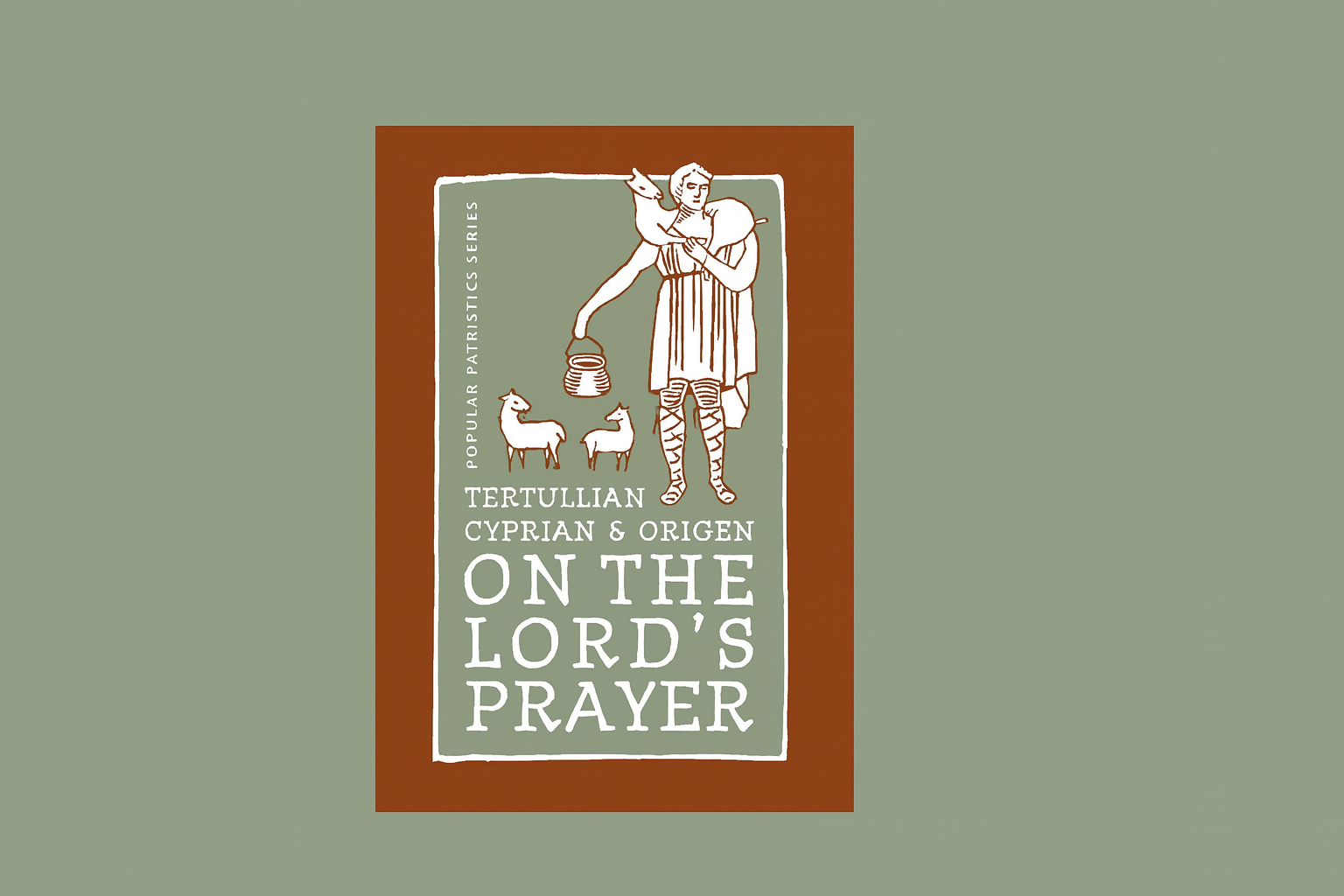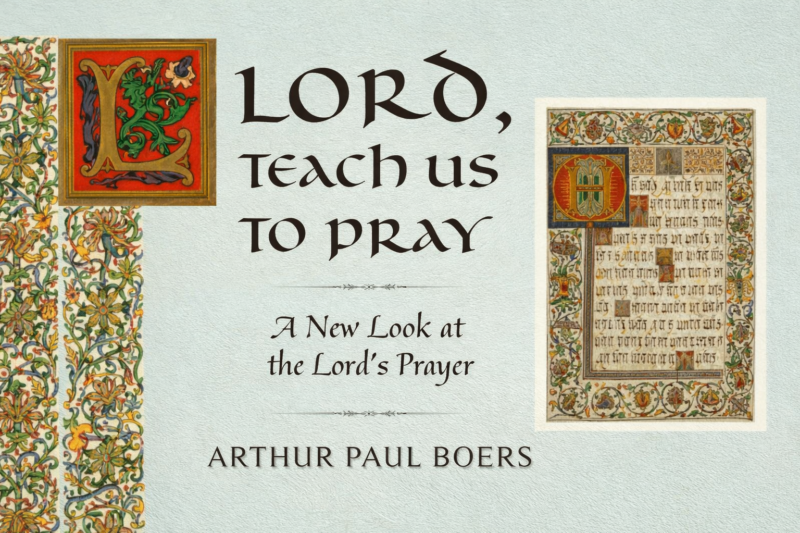
There were many vital reflections on the Lord’s Prayer in the early Patristic era of the church. In 2004, St. Vladimir’s Seminary Press published a small yet rich volume collecting the reflections of Tertullian, Cyprian, and Origen. This collects for us some of those most vital reflections. Tertullian, Cyprian & Origen On the Lord’s Prayer (Popular Patristics Series), Translated by Alistair Stewart-Sykes (a leading scholar of early Christian liturgical works and a vicar in the Diocese of Salisbury, England), this “personal-sized” small book of just over 200 pages gives us some of the earliest insights into the Lord’s Prayer outside of scriptures and the Didache.
In reading these Patristic voices, in Tertullian, Cyprian & Origen On the Lord’s Prayer (Popular Patristics Series), we see both their similarities and their distinct focuses. As Sykes notes, “Tertullian and Cyprian not only have an obvious relationship, their works are likewise similar, and derive from the same liturgical context, for all of which reasons they share an introduction” (Sykes 2004, 9). Origen, by contrast, stands somewhat apart in method and tone, exploring the praer with a deeper theological dive. However, all three patristics show how the Lord’s Prayer was central to liturgy, catechism training, and baptismal confession. The Patristic Church valued this prayer deeply, tethering its life and practice to the way of Jesus as outlined in the Sermon on the Mount. In Tertullian, Cyprian & Origen On the Lord’s Prayer (Popular Patristics Series), we see the tether it was.
About the Translation and Patristic Sources
This translation is both fresh and accessible. While generally literal, Sykes balances accuracy with readability, aiming for a broader audience rather than only specialists. He longs for readers to “profit by knowing these Fathers and their writings on the Lord’s Prayer” (Sykes 2004, 9). There are a few times when it feels hard to follow, like many more literal translations do, because it doesn’t read in the way you or I would write or speak today.
From what I can tell, Sykes also draws on the best and most respected critical editions, such as Koetschau and Hartel, noting carefully which scripture, codex, or source is used. Footnotes also explain greater commentary. Though Tertullian and Cyprian did not use the Septuagint (as Origen did), they did not rely on the Vulgate either. For consistency, all biblical references in this translation are rendered from the Septuagint (Sykes 2004, 11).
Patristic Voices: Tertullian, Cyprian, and Origen
Could there be any better glimpses into the early church than these three patristics? Sykes also gives us a glimpse into their lives with great detail. We learn about their strengths and weaknesses, quirky lives, and deep dedication. Readers will also hear from other writers of their day who interacted with them.
- Tertullian: The First Prolific Patristic Theologian. Tertullian, called “the presbyter,” was from the province of Africa, most notably Carthage. His father was a proconsular centurion (Sykes 2004, 13). Known for his character and prolific writings, he became one of the earliest significant Patristic theologians. His On Prayer is among his earlier works, written before later controversies and theological debates took shape. An oft-repeated story tells how Cyprian, later in life, confessed to never letting a day pass without reading Tertullian, whom he referred to as “the master” (Sykes 2004, 13). Eusebius, in his Ecclesiastical History, also preserves Tertullian’s reputation. Despite being driven out of the Roman church due to tensions, his role in shaping early Patristic thought cannot be overstated.
- Cyprian: Patristic Bishop and Pastor. Cyprian, Bishop of Carthage, is well-documented through both his own writings and the biography penned by his deacon Pontius. A wealthy convert who experienced a dramatic rebirth at baptism, Cyprian gave himself wholly to shepherding the church. His On Prayer, exploring the Lord’s Prayer, clearly reflects Tertullian’s influence but is marked by his pastoral heart and focus on unity.
- Origen: A Distinctive Patristic Exegete. Origen represents a different strand of Patristic reflection. Shaped by suffering (his father was martyred), Origen poured himself into study, prayer, and discipleship through his catechetical school. Known for his ascetic lifestyle, including the controversial act of self-castration in obedience to Matthew 19:12, Origen lived out his radical devotion. Platonist philosophy is pointed out to have informed much of his thought, but his writings remain profoundly exegetical and theological. For Origen, the Lord’s Prayer was tied closely to the baptismal experience. His treatment is deeply technical, marked by allegory and theological depth. Eusebius’ Ecclesiastical History provides one of our best introductions to his influence.
Augustine and Later Patristic Developments
By the time of Augustine (354–430 AD), representing the later Patristic era, the Lord’s Prayer had become fully integrated into the catechumenate. These early writers influenced many practices and traditions. Augustine notes that it was taught at the conclusion of catechumenal instruction, typically one week before the Easter Vigil (Sykes 2004, 22). After an unfolding of salvation history, candidates were taught the Lord’s Prayer as a summary of the gospel.
This was often paired with rites of exorcism and renunciation, continuing from the third through the fifth century, after which the prayer was recited as new Christians entered the assembly following baptism (Sykes 2004, 22–23). Tertullian also encouraged the newly baptized to pray to the Father with their brothers and sisters “in their mother’s house” after emerging from “the bath of their new birth” (Sykes 2004, 23).
Patristic Theology, Liturgy, and Practice
Across these Patristic witnesses in Tertullian, Cyprian & Origen On the Lord’s Prayer (Popular Patristics Series), the Lord’s Prayer is both theological and liturgical. It functioned as intercession, catechesis, and Eucharistic prayer. Tertullian and Cyprian, in third-century Africa, prescribed praying three times daily: morning, evening, and midnight—similar to the Apostolic Tradition. Origen, while differing in approach, upheld the same centrality of the prayer and still three times a day.
Their translations of the Lord’s Prayer show intriguing variations. Tertullian omits the “Our” in “Our Father,” whereas Cyprian, Augustine, and the African Bible retain it. In all their versions, “will” precedes “kingdom,” suggesting a theological emphasis on obedience and submission as prerequisites to the kingdom. All favored “debts and debtors” and “the evil one” rather than “evil” (Sykes 2004, 39). Interestingly, the African Bible concludes, “Since the power is yours in the ages of the ages” (Sykes 2004, 29), omitting the later doxology familiar to us from the Didache and later liturgical traditions.
A Few Favorite Patristic Quotes
Tertullian
“The prayer which is instituted by Christ is made up of three parts: out of word, by which it is spoken; out of spirit, by which it is powerful; out of reason, in that it reconciles.”
“Prayer is the buttress of the faith, our armor and weaponry against the enemy that watches us from every side. So never let us set out unarmed—let us remember the station by day and the vigil by night.”
Cyprian
“How great, dearest brothers, are the mysteries of the Lord’s Prayer, how many, how magnificent, gathered together in a few words, yet abundant in spiritual power.”
“When we speak with the Father in the prayer and supplication which the Son taught, we may the more readily be heard.”
Origen
“Souls that had long been barren have realized the sterility of their own motivation… and have become pregnant from the Holy Spirit through consistency in prayer, and have given birth to words of salvation filled with the perception of truth.”
“It is right that we should begin with glorying and leave off our prayer with glorifying… to whom be glory forever and ever.”
Conclusion: Patristic Wisdom for Today
I read Tertullian, Cyprian & Origen On the Lord’s Prayer (Popular Patristics Series), as part of my doctoral studies on the Lord’s Prayer at Kairos University. It has been invaluable in helping me see how the Patristic church prayed, taught, and lived this prayer. While I differ theologically at points—especially on the interpretation of “daily bread”—I found their reflections rich and formative.
The way these Patristic authors incorporate the breadth of Scripture into their reflections is essential for readers today. My only wish is that the font size had been larger and with more space in the printed version of this book. I also think it could have benefited from a more modern reading flow, attempting a bit more contemporary translation. Still, this is a book we all need to know, read, and appreciate to understand the rich Patristic heritage of the church and the central place of the Lord’s Prayer in its life.



